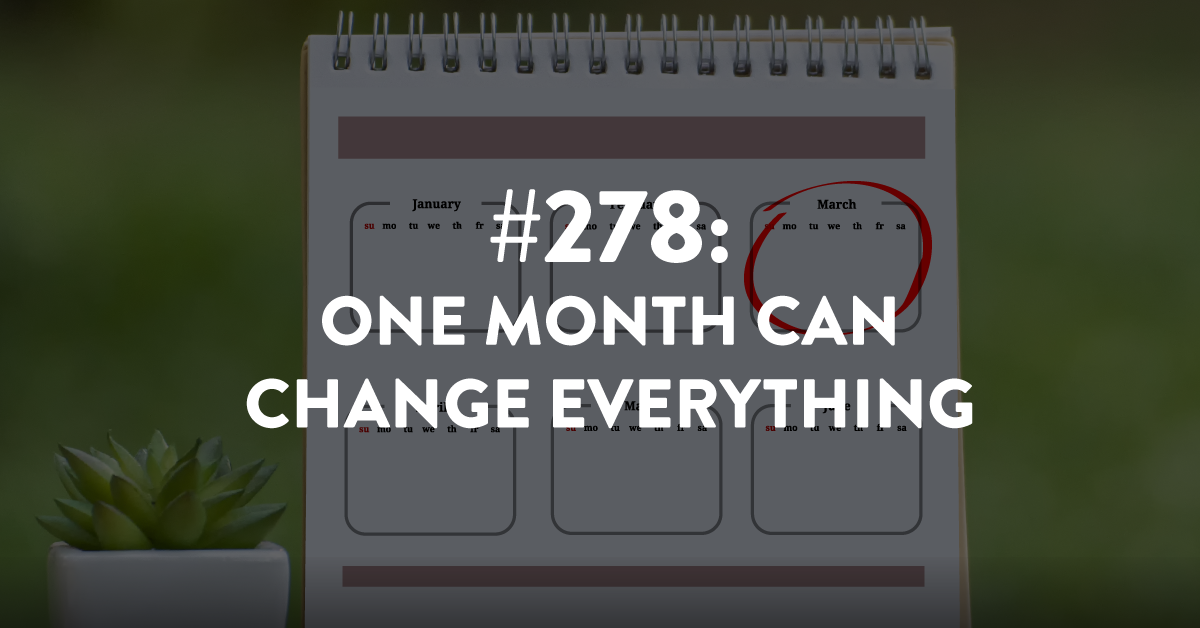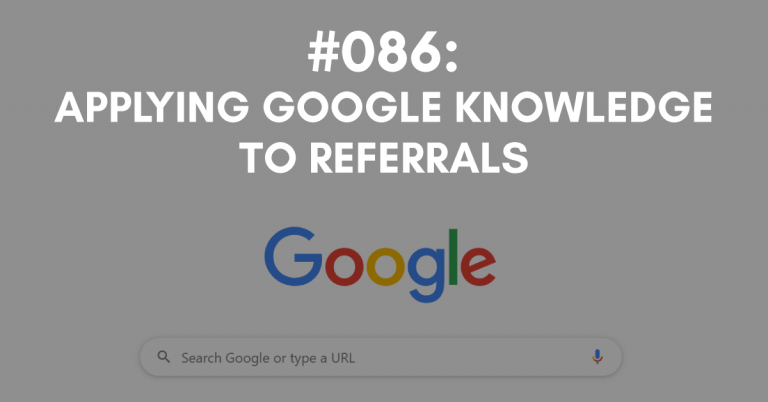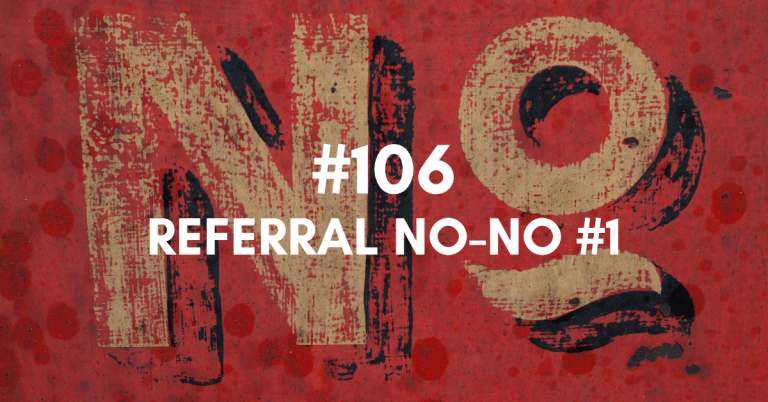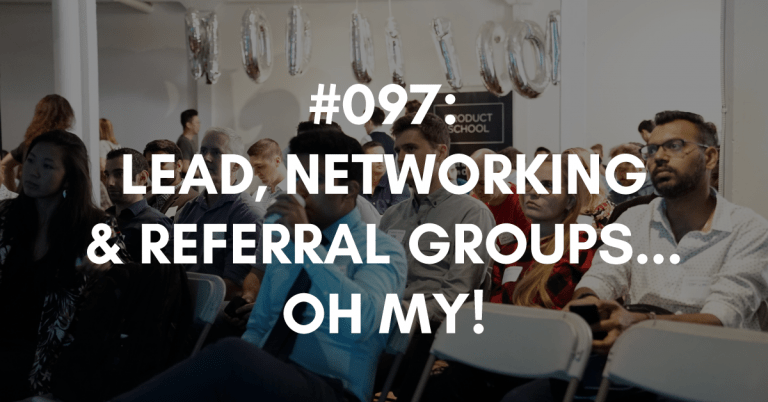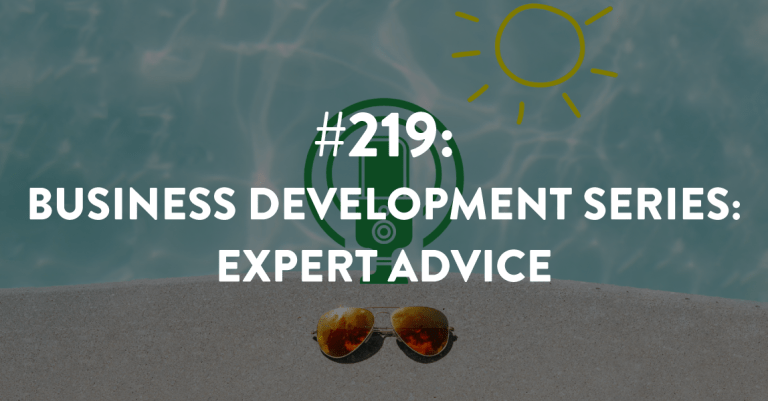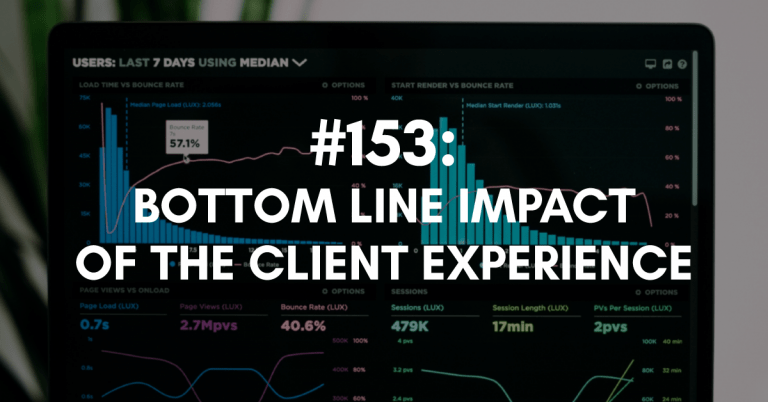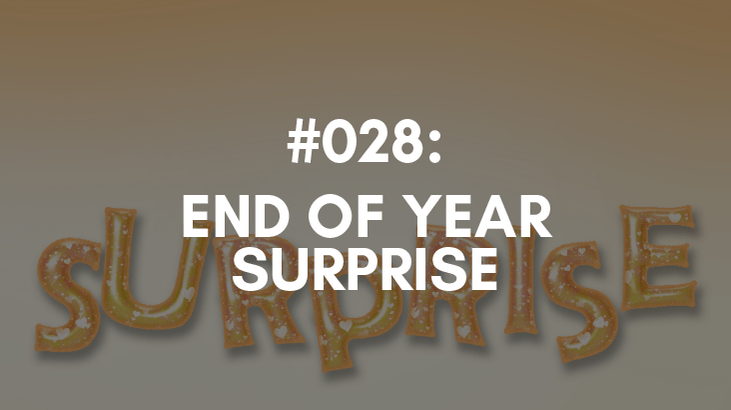Ep #278: One Month Can Change Everything
When you make the right decision, one month can change everything.
In this episode, I do something I haven’t done before – I bring on a member of our coaching program, Building a Referable Business (BRB), who has been in the program for just shy of 30 days. We have an insightful conversation where we discuss the power of making the right decision and how it can change everything in just one month.
Lois dives into what changed for her, what she got serious about, and why joining our coaching program was the right decision at the right time. Her story is a testament to the incredible results that can be achieved when you prioritize building a referable business. Whether you’re interested in joining our coaching program or simply looking for expert advice on generating referrals, this episode will provide valuable insights and inspiration.
Links Mentioned During the Episode:
Apply now to join our Building a Referable Business™ coaching program.
Learn More About Lois Weinblatt:
Lois Weinblatt is an international Executive Coach, Organizational Consultant, and founder of True North Visionaries. Her mission is to provide people with a step-by-step process to clarify, refine, and align their vision.
Visit Lois Weinblatt’s website
Follow Lois on LinkedIn
Next Episode:
Next episode is #279, where we’re going to do something a little bit different and talk to somebody at the other end of the spectrum.
Download The Full Episode Transcript
Read the Transcript Below:
Stacey Brown Randall: When you make the right decision, one month can change everything. Let’s chat about what I mean.
Hey there, and welcome to Episode 278 of the Roadmap to Referrals podcast, a show about helping you build a referable business. I’m your host, Stacey Brown Randall. My journey from a business failure to a successful business now 10 years in, I know, generating referrals naturally and consistently has made all the difference. Working with clients around the world, we leverage the science of referrals, protect relationships above all else, and help you build a referable business.
For today’s episode, I’m going to do something I haven’t really done before. And that is bring on a member of our coaching program, Building a Referable Business, the BRB coaching program, who at the time of the recording, has been in the program for just shy of 30 days.
But I want you to hear her talk about what changed, what she got serious about, what has had an impact, and why it was the right decision at the right time for her. So I’m excited for you guys to meet Lois Weinblatt.
Now, we’re going to dive right into the interview because in the very beginning, I asked her to explain what she does, which is pretty cool all in of itself. So let’s get to the interview.
Lois, welcome to our podcast. I am excited to spend this time with you and to have the listeners hear you talk about all things referrals. And so before though, we start talking about referrals, which of course we know is my favorite topic, and I know it’s hopefully one that’s quickly becoming your favorite topic, I would love for you to tell the audience a little bit about yourself and your company.
Lois Weinblatt: Thank you so much for having me, Stacey. I’m so excited to be here today. And the quick background on me is I started my company, True North Visionaries, it’ll be 10 years this November. So yes, so it’s really, really, truly, I feel like I’m on this earth to help people really, really gain clarity on what it is that they actually want for the next stage of their lives.
So I work with really driven, established business owners who are asking themselves those kind of exciting but scary questions. What do I really, really want for this next chapter of my life? Not just for my business, but for myself.
And I also work with organizations when they really need more clarity and alignment with their executive team. And they’ll bring me in to help them clarify the vision for the organization and also really clarify the values and the mission as well.
Stacey Brown Randall: You know it’s interesting I hear you talk about what you do and it always makes me think like what is it about talking about the future or where we want to go, where the next step in our world or in our lives or in our companies that’s like one part, truly exciting and second part, truly terrifying.
Lois Weinblatt: Well, I think you’re absolutely right. I mean, I think one of the reasons why it’s so daunting, one of the reasons why it always stays for people in that important but not urgent bucket is because they don’t know where to start. I have had so many people just say, I know I need to do some long-term thinking, but either it’s something I never carve out time for because I don’t know how to do it, so why would I carve out time to do something where I have no clue where to begin when I do know how to do everything else in my to-do list.
And then, even if I did carve out that time, like you said, just to be in an echo chamber of my mind isn’t going to be helpful. Like, I need some external help in figuring out how to draw those things out. And so that’s what I’m there to do is to really ask those questions and help people be really, really honest with themselves.
Because sometimes it’s just, I mean, that’s why I started my business. I went through this process myself when I was 25. I just locked myself in a room for the weekend and at the end, I was like, I don’t want anyone to ever have to do this alone.
Stacey Brown Randall: I think sometimes the best thing, I mean, my entire referral strategy was created because I needed it for myself. And I was like, other people need to know how to do this in a totally different way.
But, you know, it’s interesting. I think when you have someone to talk about, like what you do, right, what you help individual business owners or companies do with their executive team, it’s like that ability to talk it out.
And which is, I think where you find yourself saying things that you’ve always thought but never acknowledged. And you’re like, wait, did I just say that?
I remember it wasn’t because of COVID, but COVID was definitely one more straw for me. It kind of started prior to COVID. But I remember having this conversation with my husband, and I was like, I just want it simple. And like nothing that I had ever said out loud to myself, but like having a conversation with him about what I wanted our future to look like.
Let’s be honest, like once your children are out because nothing is simple and easy ’till they’re gone, but I was like, that was driving all the decisions and he was trying to understand, like why do you want to live in a tiny house in the mountains? And I was like, I just want simple.
And he was like, why do you want chickens? I’m like, I just want simple. Like to me, it would be easy to get eggs from my chickens. I don’t actually know if that’s ever gonna happen. I can barely keep a plant alive, let alone, I mean, I do a good job with our dog.
But like, I think when you’re forced to say those things out loud, you hear yourself say things and you’re like, oh my gosh, I didn’t see that coming. Like, that is how I really feel, but I’ve never actually said it. And I think that’s super valuable for the work that you do.
Lois Weinblatt: Thank you. It is. If you can’t articulate something, you kind of can’t wrap your arms around it. And so one of the things I always talk about is just words matter. The words that we’re saying in our heads to ourselves matter. The words that we’re saying to other people matter. The words that we’re talking about when we talk about our future matter.
And it’s so, so fascinating what happens when people feel like they are in a, I mean, you and I, we are all about the structure. We love a structured process.
And so it’s the same thing. It’s the idea of taking this, this concept of visioning, we can feel so nebulous and intangible and just this big idea that people tell you is important, but like, what does that even mean and how do I do it, to just step by step, if you follow these steps at the end, you’re going to have the clarity on your vision.
And so I think just the confidence people can kind of take a sigh of relief that they don’t have to come up with what those questions are. They can just be in the mode of really answering them and really thinking through them.
And I think that’s so much what you do as well. It sort of takes the guesswork out. It’s like, hey, don’t reinvent the wheel. I have this tried-and-true system, proven, proven process in place. Come on down, let’s take you through it. And then you’re going to be putting your energy towards getting more referrals, not how do I even do that.
Stacey Brown Randall: I know it’s like I wanted to tell people just do what I say. I promise you it’s going to be great. Okay, so business 10 years. That’s a huge milestone. I hit 10 years this year as well, and it means we’ve seen a thing or two, right?
Like, this is not our first rodeo with what business looks like, and sometimes we have moments within those 10 years where we’re like, why does it feel like year one all over again? Just, that’s life, right? And it was never promised to be easy, but it was promised to be interesting.
So when you think about the 10 years you’ve had in business, obviously referrals have been a part of those 10 years for you. So before we dive into like the why now looking at referrals differently for your business, kind of just give the 10-year business owner perspective on why every business, no matter what year they are in business, should be paying attention to referrals in terms of why they are important.
Lois Weinblatt: Oh my gosh, you’re gonna have to make sure you get me off my soapbox because this is near and dear to my heart. But there are just so, so many reasons why referrals are critical. But one of the main reasons is that I think it is so easy to get caught up, and I say this from deep experience, getting caught up in the shiny object syndrome of all these different methods out there for generating cold leads and cold traffic.
And it can feel sexy and exciting, and you see, you know, all these case studies of people. And like, if I see one more YouTube video with somebody showing me their Stripe balance, I don’t know what I’m going to do.
Like, I hit a $5 billion month, and that’s, wow, I’m so impressed. That’s, that’s amazing. But it gets to be this, I think it can get to be this feeling for business owners where it feels like, oh, maybe is that the only way? Or is that the only way to quote-unquote life-changing money or a change in my business that’s really gonna allow me to scale or have more passive income or kind of all these holy grails that I think are kind of put out there and feel like this magical mystical land that I can only get with a huge number of leads.
And it can sometimes feel like the message is, well, you can only get that volume of leads if you’re doing all these cold traffic methods. And I think it’s so easy to get caught up in that and chase, chase, chase.
And when you come back to it at the end of the day, it’s still a numbers game. It’s still, okay, well, then how do we build that? And how do we fund that? And how do we, all of those different pieces.
But then we can talk about the number of leads we got. But then how many of those cold, cold, ice-cold leads are going to turn into clients? Right?
I mean, that’s, I think, a lot of the story that you don’t hear. And so, my whole business, I mean, it all started from referrals. For me, it was sort of, I didn’t even, I’ve heard some really great advice, which is, I think, once you kind of have been in business for several years, it’s actually about unlearning a lot of things.
Because at the beginning of my business, I never even thought about, I mean, I did not care. I was so not focused on any of that. I put my website up in like half an hour. I was like, people aren’t going to find me on the internet. People are going to find me because I know them. And it was just so natural to me.
It was just connections and relationships and doing the best possible work that you can do, because that’s what you’re here on this earth to do, you know, is help people with this unique talent or skill or ability that you have. And for then to that naturally turn into more opportunity.
And it’s just, instead of being transactional, it’s relational. Instead of just being this numbers game, it’s this amazing opportunity to connect and to keep generating these concentric circles of people who maybe you have great connections and whether or not they become clients now or later, you continue to build out your own network. And that is, as a human, that’s critical. That becomes a huge part of your community.
So, in my own experience, I have felt such a difference just like internally within my body when I am doing work that is focused on how do I really nurture my referral relationships that feel so aligned and so what I’m all about and so, oh that means I get to have another great conversation with this person I care about versus, oh my gosh let me try to go out and get into this frenzied mode of what do I have to do to get more clicks or more this or more that.
Stacey Brown Randall: So I know that you joined BRB, the coaching program, about a month ago. So in some ways, this feels like a very unfair interview to do with you because you’re like, I’m like 30 days in.
But that’s exactly why I wanted to talk to you, because I think that that new notion of like, hey I’m taking this all in, obviously you’ve had your onboarding call with me, you’re diving into your first strategy or two. You’ve participated in some of the weekly question and answer sessions. You’re kind of getting that engine going, right, you’re trying to work on what you’re putting into place.
And what I’d love to know, before we talk about all the things you’re learning, what prompted you at the 10 year, almost the 10 year mark in business to be like, hey hold up, wait, I want to learn something when it comes to referrals differently. You found me and you’re like, this is who I want to learn from, and this is how I want to do it in the coaching program. What really prompted you to make that decision to join?
Lois Weinblatt: So, funny enough, it was my vision. I just wrote my vision, so this is my third five-year vision. It’s for May 24th, 2028. So write it now like it’s already happened.
And so part of going through my own process, my own eight-step process, I took myself through the exact same process that I take my clients through.
And so much of it was really, really being honest with myself about, not prescribing exactly how I was going to do X, Y, or Z, because the vision isn’t about the how, you work backwards and you figure out the how, but the vision itself is just, where am I going? When am I going to get there? What’s it going to look like when I arrive?
And I knew that I had had this feeling of any time where I was focused on that cold traffic stuff, I literally felt this internal tension of, I’m over here spending, again, so much time, energy, effort, and resources to try to go after this thing.
And then literally in front of me is my laptop that is full of all of these emails and calendar invites that have, like I have all these incredible visionaries and all these incredible people that I’ve worked with over the years and who have sent me referrals and they’re not getting any of that time.
Not any, of course, they were getting some, but they weren’t getting the same degree of time, energy, and effort and resources, so it felt like I’m over here like fishing when I have all these, this great bounty right here, what is going on?
And so part of my vision was to really feel like that effort that I put in, the resources were commensurate with the fact that my business has always been built on referrals.
And I find that I connect with the clients who get the most out of it when they come from referrals, you know, like there’s just, it’s that virtuous cycle.
In the past, I have worked with many other coaches. And what also struck me was that those other programs that I had been in were the philosophy of that coach was much more cold traffic minded.
So if, you know, when you’re a hammer, everything looks like a nail. And so when you come to them with issues and questions and opportunities and challenges, if that’s the lens they have on everything, then it’s going to be like, Oh, let’s solve that with going after more cold traffic. Let’s solve that with this. Let’s solve it with that.
And so I really liked your approach that was rooted in the same philosophy that I had literally just had written about in my vision, which was just really always, always making sure that I was coming back to the importance of referrals.
So once we got on a call, I actually took the longest time to decide that I’ve ever taken, which wasn’t long, but for me, it’s usually like, oh, this looks great. Twenty minutes later, I’m in. And part of my vision as well was being more discerning and really thinking about it.
But you’ll appreciate this. My husband and I were talking about it and he’s like, tell me four things you’ve learned from Stacey already before you even have joined her program.
Stacey Brown Randall: Oh, what a good question!
Lois Weinblatt: I know. I was like, babe, do you wanna be a coach? You should get into this business. So, and I talked about four specific things from your book and from your podcast that I learned and he’s like, well, that’s pretty impressive.
Stacey Brown Randall: Okay, so there’s so much that I want to unpack, because I think that your journey is important because I think people feel like there has to be some like rush to make the decision. Like, oh, I found this thing. Like you said before, you’d just be like, okay, let’s do it. Let’s do it. Let’s do it. Right?
And you’re trying to be more intentional. And I feel like there’s like this whole shift happening out there with business owners in general where we’re all doing that. We’re all like, wait, before I just like throw some money at it, let me just pause for a minute and make sure this is what I want it to be.
And so I love that your husband was like, tell me, what have you learned, right? Like, what are the couple of things that you’ve learned?
And I love that you also decided to discern, does her philosophy, right, like who she is and what she believes and what she teaches, does it align with me?
Because not only is it referrals extremely different from anything cold, right? Or any type of those funnel building traffic kind of things that you do. I’m also on the other end of the spectrum for the people who teach referrals.
So it’s like, a lot of people will come and they’ll be like, I want referrals, but it doesn’t align with me to have to ask people. I’m like, good, because you shouldn’t be. It’s bad. Don’t do that.
And they’re like, oh, oh, so we can see it differently. And I think there’s that, I think the pendulum is swinging back for business owners, like really getting back to connected to like, what do I believe? What do I want? How do I want to treat people? What do I want this business to look like? And like just taking a pause.
And I think the pendulum swings, like, I mean, that’s what it does, right? It’s always swinging back and forth. And we’re just kind of on that swing back of that discernment approach.
And if anyone listening is like, does Stacey ever bring in clients that aren’t actually referred to her?
The answer is yes. Here is Lois. She found me through a book search, I mean an Amazon search looking for books on referrals and landed on mine.
So, I mean, it doesn’t happen as often. I actually have, we have one person in our BRB coaching program that came through a Facebook ad, and I haven’t run Facebook ads since like 2017. He’s like the one person who’s like still with me. He’s an amazing client. He was like, I’m the one from a Facebook ad. And he’s like, they do work. I’m like, for one client.
Lois Weinblatt: Right, right.
Stacey Brown Randall: One client that I know of. And then like we have somebody else in BRB who’s like, no I connected with Stacey over LinkedIn and then went through the process and his journey of deciding that he wanted to be a part of the coaching program too.
So, yes, lots of people refer but that’s not how everybody gets there. And I think that’s important.
And I think that you recognizing you’d set a vision for this and then you did your own process of figuring out, okay, this is the what I want, now how am I going to make it happen? And you gave yourself space to make that decision.
I can’t tell you how many business coaches that I have conversations with and they’re like, the only thing you’re missing, Stacey, is the scarcity factor. And I’m like ah, you mean fake scarcity?
You mean, like it’ll go away in 30 days, but yet actually in the next 30 days it’ll be reopened? Like, I can’t stand that.
I was like, I built BRB specifically because I wanted it to be available when the person was ready. That does mean like sometimes we get to help people like get to the point of like, are you ready? There’s definitely more follow up that happens like, is this still a priority? Do you want to make this happen?
Because there isn’t that scarcity to kind of like, why I always felt like I’m goaded into making a decision. Like the clock is ticking, you got to do it. And I never think good decisions are made in that type of environment.
And so that’s why I don’t have people make them when they’re joining me. But to that point, somebody’s got to be ready. They got to go on that journey. They got to decide, not only do I want referrals, but I want referrals the way that Stacey teaches them and then make that decision.
So I’m glad your husband asked you that question. And he was a part of that decision-making process. Kudos to him. Hopefully I’ll get to meet him one day, maybe before you guys moved to Spain. I think that that is really incredible.
Stacey Brown Randall: Hey there, pardon the interruption. Interested in learning more about how to build a referable business that doubles, triples, or quadruples its referrals in as little as 90 days? Find all the details about the program and the link to complete your application at StaceyBrownRandall.com/referable. That’s StaceyBrownRandall.com/referable. And Stacey has an E. Now back to the episode.
Stacey Brown Randall: You’ve only been in like 30 days-ish, give or take, from that perspective. And so this may be like unfair questioning from that perspective, but what are those kind of like those early, if you have like one or two, like early ahas that you knew what you were getting before you came in and then you got in and you’re like, oh, wow, this is something different or new or whatever. It’s just like an aha moment. It can be tiny, it can be big, but have you experienced any of those in your first little bit of being in this program?
Lois Weinblatt: Coming into the program, one of my biggest questions was, okay, well, what if you have somebody who refers you many times? I know you don’t just send the same card. How can you switch it? Now, again, I could just sit there and think through it, and I’m sure come up with some ideas. But rather than spend my time on that, I’d rather have an expert be like, here’s seven things you can say. Awesome. Now I can spend my time and energy on my own clients and my referral partners.
So the language piece has been super helpful. Another piece that has been big for me is thinking about the client experience.
I grew up in the hospitality world and came from an organization that was all about customer experience and that was such a formative part of what I learned and I, you know, put my all into the work with my clients. And so I was thinking a lot about that experience of what they’re getting from the process itself, but not as much zooming out to what does that whole experience look like.
And because I’m not trying to scale to 800,000 clients, I felt like I almost was in a space of I didn’t have to have any, not no consistency, but it was, I was like, well, it doesn’t have to be exactly the same for everybody because I don’t have 5 billion clients. I can manage it. It can be custom for this person and a little unique here.
And I think what I’m learning is when is the time to be, have it be unique to that specific person. And when is it like, actually, here’s where we wanted to make it more consistent for everybody across the board so that the unique touches are even more special, but you’re creating something that’s sustainable instead of, oh, wow, you pulled it off once and now it’s never happening again.
Stacey Brown Randall: It’s never going to happen. Yeah. And I think that that repeatable piece to the client experience is always going to come first before we move into the uniqueness of it. And I’m glad that that was something you like hooked in on, because if not, part of my job and what I want to do for people is to also I want to save you time.
Like I want you to build your business to whatever you want it to look like. But if you’re like me and you’re like, hey, I want to help a ton of people, but I also want to have a ton of free time. I want to help you build that.
Like I was having coffee with someone today and they’re like, how big is your team? And I was like, it’s just me. And they’re like, but… They were a previous client of mine, they’re like, but I’ve seen how it feels so personalized, and I’ve seen how everything is. And they’re like, what do you mean it’s just you?
And I’m like, yeah. I was like, efficiency always has its place, but it’s never going to take away from complete and total engagement. That has its place too, but it’s the when you do those things that allows you to survive and do them for everybody. So I’m glad you brought that up.
Okay, so we know there are a bunch of business owners listening right now. And they may just want you to tell them, Lois, tell me what I need to know to make the decision to join you inside BRB. What would you tell them?
Lois Weinblatt: I think one of the things that you said to me that really stuck out in our conversation was, I’m probably going to get to know the names of some of your referral sources. And I have been in other group coaching calls where there were so many people that, are you kidding me? They weren’t going to remember anything about my business or myself or, you know, that just wasn’t going to happen.
And maybe I could still get some great insights and that’s awesome. And maybe they would be really peppy and like have a good answer, but there wasn’t, there was really going to be that line of like, you can come to a group call. And I knew, I loved that you have the combination of both that yes, there’s the group. And I can also connect with you individually for milestone calls and things like that.
So I feel like if you are somebody who wants to work with an expert, and you realize that you have a limited amount of time and energy and like you can always make more money but you’re never going to get the time and energy back, then finding somebody who you click with and whose philosophy you resonate with is what it’s all about.
So if you are in that place of, referrals are so critical to my business, but I just want to be able to take an approach that is proven with somebody that I feel like they are the guide for me, and this is something that I can repeat year after year after year, then this is where you need to be.
Stacey Brown Randall: The reason why we keep BRB small is because I want to know all these things. Because when you ask me a question about how do I deal with this situation, or what do I say in this opportunity, I need to be thinking like, Lois, the visionary consultant, not, well, I don’t know, is she an attorney? Is she a CPA? Let me just give you some generic advice.
Like, I want to be really clear on that because, you know, one of the things we talk about and it’s part of the philosophy is, is that yes, whatever we do has to work, but it also has to be authentic to us. Which means for me to help you be authentic, I’ve got to know things about you.
So you’re never, no one’s ever going to be in BRB and there’s going to be like hundreds of people in there. I mean, you probably, won’t ever be in BRB and you’ll feel like there’s 50 people in there. Like we keep it small on purpose, like not tiny, but we keep it small on purpose because I know everybody, as much as they will let me know them. I know them and I know their business.
Lois Weinblatt: Right, right.
Stacey Brown Randall: So when, you know, it’s like when Alex asks a question, I’m like, okay, let’s talk about this from a real estate agent perspective. Or when Lacey asks a question, I’m like, okay, let’s talk about this from an interior designer perspective. And it’s just different.
And it’s even different, like, I have a lot of consultants, right, as you know, in the group. And like, when I’m talking to Brian, I know, okay, he’s like a lobby consultant. It’s very different than talking to you as a consultant, you know, who is doing the visionary work versus talking to somebody else, like Adam, who’s doing franchise consulting.
So like, it’s not even like, you can look at it and be like, oh, they’re just in the consultant bucket. Here’s my spiel. It’s like, no, they do very different things. And knowing that and being able to use that to inform the advice that I give allows me to be very, very targeted in what I say, which let’s be honest, allows you to have more success with the advice that I’m ultimately giving.
Lois Weinblatt: Completely.
Stacey Brown Randall: Yeah. No, I think that’s great. Okay, cool. So tell everybody where they can find you and learn more about you if they are interested. And of course, everything you say I’ll put in the show notes too but tell folks where they can learn more about you.
Lois Weinblatt: My website is truenorthvisionaries.com.
Stacey Brown Randall: Lois, thank you so much for spending time with me today. I really appreciate it. These are some of my favorite conversations to have, just to talk to people about, sometimes I hear things and I’m like, oh, I didn’t know you thought that. I didn’t know that mattered to you. And like, they’re really powerful for me as well. So thank you for your time today.
Lois Weinblatt: Thanks so much for having me.
Stacey Brown Randall: Like I mentioned, I am going to put the resources for this episode so you guys can connect with Lois if you are interested on the show notes page for this episode, which is StaceyBrownRandall.com/278.
And before I let you go, I just want to bring your attention to something that really struck me in the interview with Lois. And that was the conversation she shared that she and her husband had about making the decision to join this program and how he challenged her to say, hey, you’ve been listening to Stacey’s podcast. You’ve been reading her book. You’ve been following her on social media. What are the things she’s taught you already before you’ve even considered joining the program?
Because that allowed her, and it’s a brilliant question, so kudos to her husband, but it’s a brilliant question because it allows you to understand, does your philosophy resonate with the person whose program you’re planning to join?
What have they taught you already? Because if they can teach you some things, which is pretty much for free when you’re doing it from the podcast, or the website, or social media, or the book, but when you can do it for free and get really good ideas, then, of course, you can only imagine how much better it’s going to be once you’re on the inside.
And the fact that he challenged her to say, hey, give me four things that you’ve learned from Stacey before you’ve paid her a dime, other than the fact she paid like Amazon probably $13, $14 for the book, but what have you learned before you pay her any money?
And that is such a critical question. And I think before you make any decisions to invest in anything in your business, ask yourself the same questions. Did you learn something that maybe you can’t learn anywhere else when you’re listening to that expert or myself? Do you believe and agree with their philosophy? And is this someone you want to continue to learn from?
Such a critical question to ask yourself when you’re making an investment in your business. Whether that is because you’re considering joining my program, BRB, and that’s my coaching program, or even one of my online programs, or any other expert or program that you’re considering investing in in the future. So take that to heart. I think that’s a really important thing to consider.
But again, the show notes page for this episode, where you can connect with Lois and get all the details, StaceyBrownRandall.com/278.
Coming up next week is episode 279, and we’re going to go to the other end of the spectrum. If Lois was here to talk to us and she’s barely in BRB for 30 days, well, we’re going to do something a little bit different and talk to somebody at the other end of the spectrum.
All right. Until then, you know what to do, my friend. Take control of your referrals and build a referable business. Bye for now.

